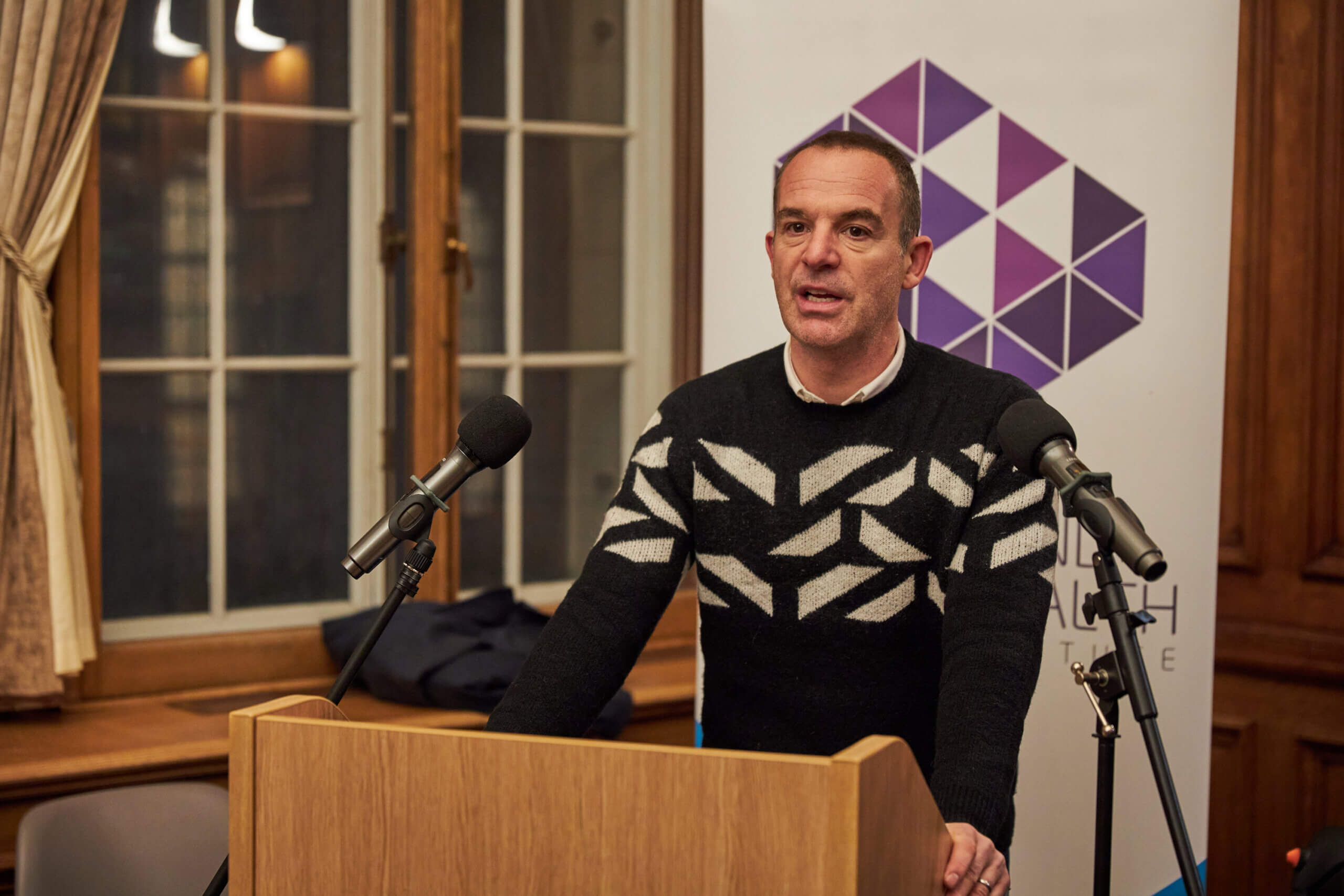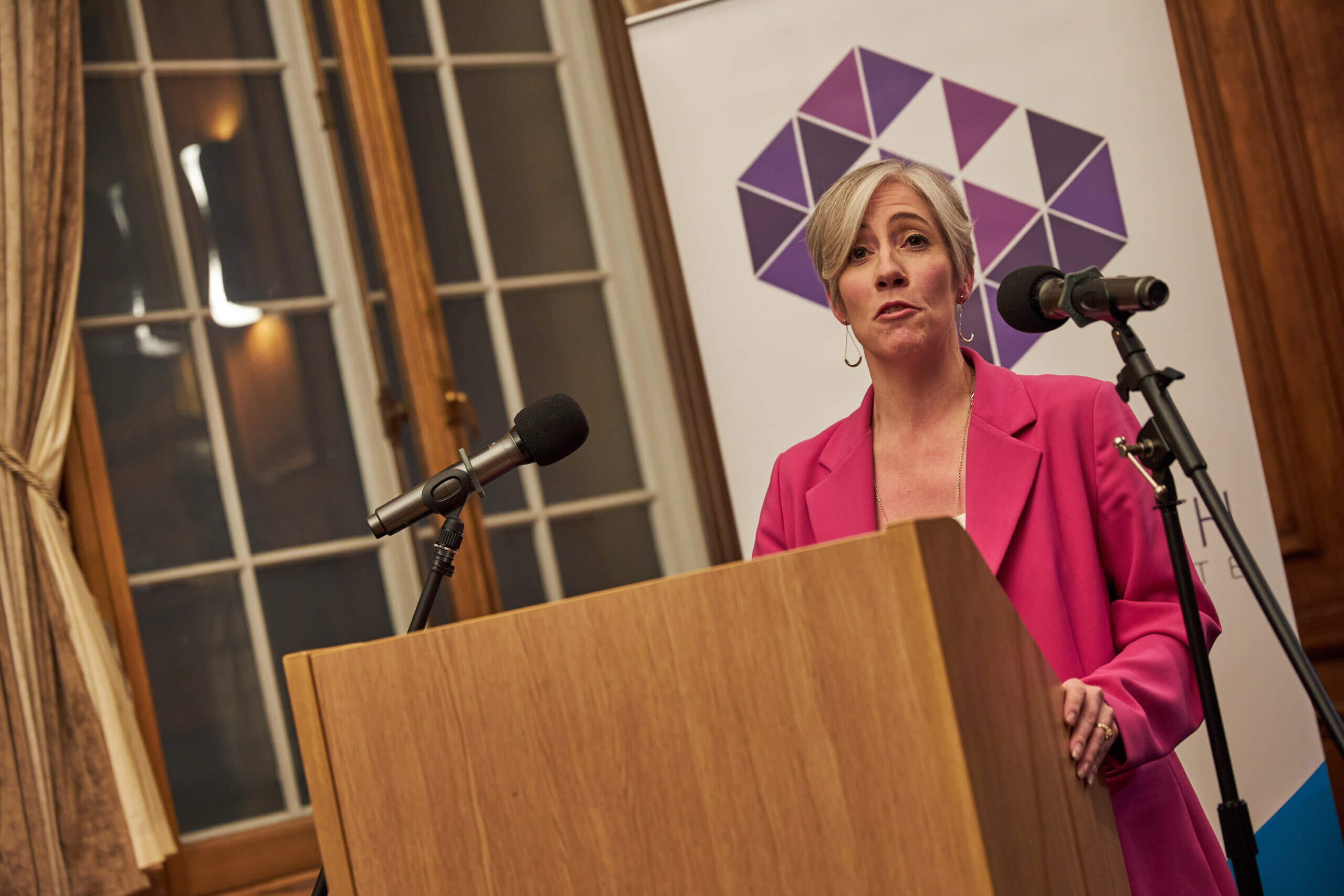
Cara MacSherry, External Affairs Intern, Money and Mental Health Policy Institute
Debts and despair: launch event recap
21 December 2023
- We recently launched new research on the psychological impact of debt collection activity.
- To mark this launch, we held an event in Westminster during which we heard from our Chair and Founder Martin Lewis, an expert by experience from our Research Community, and speakers from frontline politics, regulation and debt advice.
- It was encouraging to have widespread support in the room for the report’s main recommendation. This would see the government and regulators place limits on how often creditors can get in touch with people about missed payments.
- We are grateful to all of our speakers and to everyone who attended the event, and look forward to continuing to push this work forward next year.
This month we published our latest research on the psychological impact of debt collection practices. Our Debts and despair launch event took place in Westminster and we were delighted to welcome speakers from across the political spectrum, regulators and debt advice charities.
It was a great opportunity to share the research and hear from some fantastic speakers who shared their insight and reflections on our recommendations.
Introducing our latest research
The event was hosted by our Chair and Founder Martin Lewis, who began by underlining the importance of getting debt collection practices right for the millions of people who have fallen behind on payments during the cost of living crisis. Current debt collection practices have been designed without taking into account the potential effect on people with mental health problems. Pressuring and threatening people with legal action does not help people get out of debt. Our report sets out how aggressive collections processes could be reformed to support and reduce the harm people in debt experience.
‘These recommendations are what’s best for creditors, best for the individual and best for the economy’ – Martin Lewis

Then our Senior Research Officer, Toby Murray — who co-authored the report — shared our report findings and recommendations. It shows 2.5m people in the UK feel harassed by the volume of messages they get from creditors. Our Research Community told us of the effect that high levels of contact from debtors can have on their mental health, with one participant in the research saying:
“I am left feeling more depressed. My anxiety is through the roof. I live in constant worry and stress 24/7. I do not sleep very well, and if I do sleep, it is not a restful sleep, and I often wake up anxious. I feel sick when the letterbox goes or if the house phone rings. My mobile is on silent.” Expert by experience
This is why we are calling on the government and regulators, in particular the Financial Conduct Authority (FCA), to put limits on how often creditors can contact people about their debts.

We were honoured to welcome a member of our Research Community, Ann, to speak at the event. Ann spoke passionately to our Interim Head of Research and Policy, Nikki Bond, about the impact that the volume of letters, calls and threats of legal action had on her mental health. Ann spoke about the stigma that is still too often attached to being in debt and unable to make repayments.
Raising these issues on the political agenda
We were delighted to be joined by Economic Secretary to the Treasury, Bim Afolami. Bim underlined the work that has been done by the government to support people struggling with money and mental health problems in recent years, such as the Breathing Space programme. However, he admitted that there is still much more to do to improve outcomes for people with mental health problems and money worries. He spoke of his willingness to work with the FCA to prevent people feeling harassed by contact from their creditors.

“It is incumbent to say that the FCA and government needs to work together in these things, it is the responsibility of parliament to recognise that this lies not only at the feet of the regulator.” Bim Afolami MP
Luciana Berger, who is a former Labour Shadow Mental Health Minister, as well as Chair of the Maternal Mental Health Alliance, spoke next. She highlighted the importance of this research, and how the recommendations could make a real difference in people’s lives. This is especially important given the stigma and shame surrounding money and mental health problems. Luciana highlighted that our recommendations are tangible asks that align closely with Labour’s priorities on strengthening consumer protections. “We can make a real difference on something that is not niche and is really important,” she said, highlighting the over 5 million people who are currently behind on at least one consumer credit payment.

Given the fact our research calls for strong action from regulators, it was brilliant to have Sheldon Mills, Executive Director, Consumers and Competition at the Financial Conduct Authority, speak at our event. Sheldon acknowledged that there is a lot more to do to protect consumers, especially given the introduction of the Consumer Duty. However, we were delighted when he committed to looking closely at the recommendations in our new report.

“We are going to consider these recommendations. Whilst it’s complex and difficult to create what you are asking for, it is something that deserves considerable contemplation.” Sheldon Mills
We next heard from Daisy Cooper MP, the Liberal Democrats’ Health and Social Care Spokesperson. Daisy drew on her experience as an MP to reflect on the importance of involving lived experience in policy making, to ensure policy is influenced by the needs of the people it will affect.

“Policy is often done to people and not with people, this isn’t right.” Daisy Cooper MP
Daisy called on the FCA to really look at this issue and to go further in helping people. She also committed to explore how our recommendations could fit with the Liberal Democrats’ pledge to introduce a new ‘mental health MOT’.
Drew Hendry MP, the SNP’s Economy Spokesperson in Westminster, echoed Daisy’s call for the FCA to act on these ‘reasonable and doable’ recommendations. He also reflected on initiatives brought forth by the Scottish government and Highland Council in supporting people in arrears. He concluded by stating that there is always more work to be done, we can always go further in getting people the right support. The asks in this report are “reasonable” and “designed to help people directly.”

Our final speaker of the evening was Muna Yassin, the CEO of Rooted Finance. Muna concluded the evening by emphasising the importance of embedding respect and dignity into debt collection processes. She highlighted that the root to getting to good solutions is listening to people and their lived experience — that this is key to understanding how we can design services that are genuinely serving the people who use them.

We want to thank Martin, all of our speakers and our guests for coming to this launch and making it a success. The change we’re calling for would mean fewer people feeling bombarded and harassed by creditors. We look forward to continuing to push for this progress next year and hope you’ll support us along the way. You can read more about the report here.